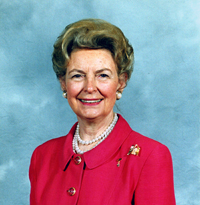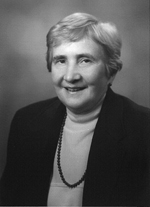
Courtesy of WUSTL Photo Services
More than 30 students representing Washington University’s graduate and undergraduate schools met on Monday to begin planning a protest of the University’s decision to award Phyllis Schlafly an honorary degree.
Many of those in attendance were members of the Class of 2008, but several professors, community members and underclassmen took part in the discussion as well.
The announcement that Schlafly, a leader of the national conservative movement since the 1960s, would receive an honorary doctorate has galvanized students who take offense with her stances on marital rape, abortion and the role of women in society to speak out.
“She is not representative of the community we want to build here. She has made statements that go against the basic tenets of the University,” said Dan Tilden, a graduating senior and the leader of the protest. “I couldn’t sit in commencement as a senior and do something that is recognizing her not as a politician but as a person.”
According to Tilden, the students involved with the effort are looking to find a way to reverse the University’s decision to award Schlafly a degree or, if that proves impossible, to make a statement of protest during the commencement exercises.
A Facebook group, entitled “No honorary doctorate for anti-feminist Phyllis Schlafly,” has gained more than 1,000 members since being formed a week ago. In comparison, a group supporting Schlafly, entitled “In Support of Phyllis Schlafly’s Honorary Degree from Wash U,” has approximately 25 members.
“Outside of how anyone feels about her political views, its important that the University be willing to give degrees to conservatives as well as liberals,” Rachel Wisdom, a freshman and the creator of the pro-Schlafly group, said. “In addition, I think she’s actually a strong defender of women’s rights.”
According to Wisdom, Schlafly’s stances protect women’s exemption from the draft and the right of women to choose to serve in the role of homemaker.
Schafly is best known for her role in leading efforts to block the Equal Rights Amendment in the 1970s and for leading a critique against feminism.
According to The Sun Journal, a Maine newspaper, at a speech at Bates college in 2007 Schalfly belittled the feminist movement as “teaching women to be victims,” argued that feminism “is incompatible with marriage and motherhood” and asserted that “By getting married, the woman has consented to sex, and I don’t think you can call it rape.”
Students who support awarding Schlafly with a degree took issue with the way that her statements in Maine were portrayed, arguing that Schlafly saw other ways to protect women from spousal abuse.
“I spoke with Mrs. Schlafly about that [statement] yesterday and the issue is that she was trying to create a legal distinction,” Wisdom said. “Women who are being abused by their husbands are protected by existing assault and battery laws and it would be trouble to argue that something is rape when you have already consented to sex by getting married.”
At the meeting, participants discussed options for protesting the decision during the commencement ceremony, including wearing pink armbands, holding signs to protest Schalfly’s presence and facing away from the lectern when Schlafly was awarded her degree.
“Don’t think that the very possibility of a disruption to the University’s most solemn event would not sway the University,” Michael Murphy, a lecturer in the Women and Gender studies department, said during the discussion.
The St. Louis Post-Dispatch reported on Monday that Mary Ann Dzuback, the director of the women and gender studies department, would not take part in commencement exercises, along with several other members of the department.
Though Wisdom agreed that students and faculty had a right to protest the decision to award Schlafly a degree, she felt that boycotting commencement exercises-especially on the part of faculty-was extreme.
“Graduation to me is not about Phyllis or Chris Matthews or any of the other honorary degree recipients, its about the students,” Wisdom said. “The professors should be there to support their students regardless of their political beliefs.”
At the meeting, one student suggested using the slogan “There is only one woman at this ceremony that should not be getting a degree,” in response to Schlafly’s positions about women’s gender roles.
The meeting also looked to answer questions about how to inform the student body about Schlafly’s views and how to alert the University community-and the outside media-about the dissatisfaction over Schalfly’s selection.
In response to protest over the announcement made last Monday, the University issued a statement over the weekend affirming its decision to award the degree.
“In any community with a large number of people and a diversity of viewpoints, it would be impossible to make a selection with which everyone would agree. That is the very nature of a university,” the statement read. “Alumna Phyllis Schlafly’s articulation of her perspectives has been a significant part of American life during the last half of the 20th century and now the 21st century, serving as a lightning rod for vigorous debate on difficult issues where differences of opinion are profound and passionate.”
The statement brought to light the University’s decision-making process for honorary degrees, which requires a unanimous vote of the Board of Trustees based on recommendations from the Honorary Degree Committee. The committee is chaired by a member of the Board of Trustees and includes about 20 Washington University students, faculty, staff and other members of the Board of Trustees.
Schlafly is set to receive a doctorate of humane letters and is an alumna of both the College of Arts & Sciences and the Law School. As an honorary degree recipient, Schlafly will not address graduates, she will only be awarded the degree.
The move to rescind Schlafly’s degree comes less than a week after Northwestern University announced that it would not award the controversial Rev. Jeremiah Wright an honorary doctorate at commencement proceedings there. In recent months, Rev. Wright has drawn attention for his statements on race relations, America, 9/11 and his now severed connection with presidential candidate Sen. Barack Obama (D-Ill.).
In a statement explaining its decision, Northwestern wrote, “Commencement at Northwestern is a time of celebration of the accomplishments of Northwestern’s graduating students and their families. In light of the controversy around Dr. Wright and to ensure that the celebratory character of Commencement not be affected, the University has withdrawn its invitation to Dr. Wright.”
Schlafly is one of six scheduled to receive an honorary doctorate at commencement on May 16.
Check back throughout the week for more coverage of Commencement including updates on the protest and an interview with Phyllis Schlafly.
 Courtesy of WUSTL Photo Services
Courtesy of WUSTL Photo Services Courtesy of WUSTL Photo Services
Courtesy of WUSTL Photo Services Scott Bressler
Scott Bressler Scott Bressler
Scott Bressler Courtesy of Tammi Cooks
Courtesy of Tammi Cooks Scott Bressler
Scott Bressler